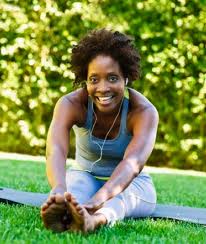 Many African-American women in a small survey said they avoided exercise at least sometimes because it could ruin their hairstyles, researchers reported.
Many African-American women in a small survey said they avoided exercise at least sometimes because it could ruin their hairstyles, researchers reported.
Among 103 African-American women interviewed in a medical center waiting room, 39 said they had kept from exercising at some point because it would interfere with their hair-care practices, according to Amy J. McMichael, MD, of Wake Forest University in Winston-Salem, N.C., and colleagues.
On the other hand, half the respondents indicated that they had considered changing their hairstyles to accommodate exercise, the researchers reported online in Archives of Dermatology. Thirty-one said they exercised less than they would like because of their hair.
The findings emerged from a more general inquiry into hair-care practices among African-American women. McMichael and colleagues -- mostly dermatologists -- noted that Americans cite a great many reasons for not exercising as much as they know they should, such as interference from work or household responsibilities and lack of access to appropriate facilities.
"Dermatological barriers are not as well explored in the literature," they wrote, although at least one previous study had found that some African-American women had reported that heavy exercise was incompatible with their hairdos.
To fill this gap, the investigators developed a 40-item survey and sought to administer it to a total of 123 African-American women in a dermatology clinic waiting room. Of those, 20 did not give responses, leaving 103 for analysis. Their mean age was 42 (range 21 to 60).
Only 27% of the respondents said they left their hair natural. Some 62% had adopted a relaxed look, with 18% using weaves or wigs, 22% using hot-combing or flat-ironing, 19% having braids, and 6% using chemical curling (numbers add up to more than 100% because hairstyles could have more than one of these features).
Most of the women reported some problems with their hair or scalp such as strand breakage with normal styling (55%), itching (55%), flaking (32%), hair falling out (23%), and pustules or bumps (10%). About one-third of those reporting itching said it worsened with exercise or heat.
Among the 39 respondents who said they had avoided exercise because of their hair, the following specific problems were cited as the root of the conflict:
- Sweating out the styling: 38%
- Time needed for washing/drying afterward: 22%
- Itching/burning: 5%
- Bumps on scalp: 3%
McMichael and colleagues concluded that there may be a role for dermatologists in helping African-American women exercise more regularly. Noting the substantial number of respondents with scalp complaints, they suggested that dermatologists should be attentive to such symptoms with their African-American patients. Moreover, they argued, "dermatologists can discuss hair management strategies that facilitate routinely performing exercise."
The researchers reported some limitations to the study. It may not be generalizable to African-American women in other parts of the country, they noted. Also, because respondents were recruited in a dermatology clinic, individuals with hair and scalp complaints may have been overrepresented.
Source reference:
Hall R, et al "Hair care practices as a barrier to physical activity in African American women" Arch Dermatol 2012; DOI: 10.1001/jamadermatol.2013.1946.
John Gever
Senior Editor
John Gever, Senior Editor, has covered biomedicine and medical technology for 30 years. He holds a B.S. from the University of Michigan and an M.S. from Boston University. Now based in Pittsburgh, he is the daily assignment editor for MedPage Today as well as general factotum on the reporting side. Go Pirates/Penguins/Steelers!

 Women who have more than two alcoholic drinks a week -- particularly nonlight beer -- appear to be at increased risk of developing the skin condition
Women who have more than two alcoholic drinks a week -- particularly nonlight beer -- appear to be at increased risk of developing the skin condition